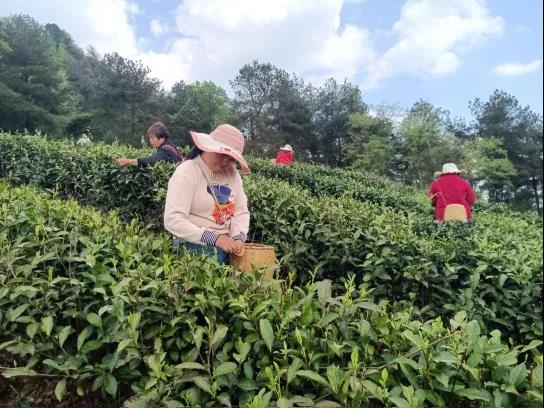Tea plantation in Xifeng contributes to rural vitalization
When the weather in Xifeng county, Guiyang begins to warm up in April, the tea trees in Tuanyuanshan village are growing rapidly. Villagers are now busy harvesting the spring tea leaves, filling their bamboo baskets with the emerald green buds.
Tuanyuanshan Tea Plantation covers an area of over 700 mu (46.67 hectares) and is expected to produce nearly 9,000 kilograms of tea leaves this year, with a labor demand of around 10,000 workers.

The villagers pick tea leaves in the plantation. [Photo/WeChat account of Xifeng county]
Located at an average altitude of 1,200 meters, Tuanyuanshan village is often shrouded in mist and receives abundant rainfall. The soil conditions are ideal for tea cultivation, resulting in high-quality tea leaves with excellent flavor.
"The tea industry has become one of the main sources of income for villagers in Tuanyuanshan village," said Tao Yanmei, Party secretary of the village.
Since 2019, Tuanyuanshan village has been operating on a "cooperative + village collective + farmers" model, leveraging the village's unique geographical advantages to cultivate over 1,000 mu of tea plantations. This inspired the surrounding areas to plant tea on more than 400 mu of land, providing villagers with additional employment opportunities of picking and processing tea.
Today, the tea trees in Tuanyuanshan village represent a major source of wealth, with the villagers increasing their incomes by cultivating tea or finding jobs in tea plantation. The village is actively working to expand its tea brand and achieve both ecological and economic benefits.
Presented by China Daily.
黔ICP备05001922号-3
